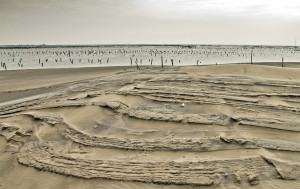Climate challenges
Jean Jouzel was the guest of honor at the HydroGaïa 2016 trade show. The Nobel Prize winner paints an uncompromising picture of our planet's climate future. "Stabilizing the greenhouse effect if we don't want to head for disaster: it's a matter of simple common sense," explains Jean Jouzel.

For the Nobel Prize winner, the situation is serious. But he believes that politicians are now taking seriously a scientific community that has been warning them for more than 30 years about the dangers of global warming.
Short deadline
First observation: "Global warming is unequivocal and unprecedented. It is largely due, estimated at 95%, to human activities." The main culprits identified are greenhouse gases. Stabilizing the greenhouse effect therefore means reducing emissions. If nothing is done, we can expect"a warming of 4 to 5 degrees Celsius by 2100."
This is a sudden, unprecedented, and extremely worrying rise in temperature, especially as it could continue to increase... "A frightening prospect: we are moving into another world," comments the climatologist. A danger in the short term: "It does not threaten future generations, but today's young people," he explains.
Irreversible
Reversing the trend? Impossible. When it comes to climate change, there is no turning back... and we are paying the price for every past indecision. Hence the importance of adopting virtuous behavior today. Translation: in very concrete terms, this means "rapidly and significantly divesting from the fossil fuel sector."
"Global warming is here, it is inevitable, it is irreversible," insists Jean Jouzel. The only feasible goal is to keep it within reasonable limits so that we can adapt to it. Keeping the average global temperature rise below 2 degrees by the end of the century is one of the main points of the Paris Climate Agreement (COP21).
Challenge
"If we want to stay below 2 degrees, we only have about 20 years left to use fossil fuels at the current rate,"comments Jean Jouzel: "A real challenge!" And while the terms of the Paris conference remain "far from the target, " the climatologist nevertheless welcomes this "universal agreement" signed by the 195 countries present.
Next step: COP 22, to be held in Marrakesh from November 7 to 18, 2016. Following the Paris agreements, this meeting is expected to be a "COP of action.""We must act now! It is technically possible, and for the younger generations, the challenge is exciting: to change the world, rather than continue on the same path." A low-cost revolution, says the climatologist: "Staying below 2 degrees would amount to reducing GDP by about one year every 30 years. It's not suicidal, it's just another form of development, "he concludes.
If nothing is done...
With an average temperature increase of 4 to 5°C, serious consequences are to be expected in the Mediterranean region and throughout the world...
- ocean acidification: the oceans are now twice as acidic as they were at the beginning of the last century, posing a direct threat to fish and coral reefs;
- "extreme weather events": droughts, floods, heatwaves, cyclones, etc. In our regions, an increase in extreme weather events such as those seen in the Cévennes is to be expected;
- risks to populations: climate refugees, water scarcity, food shortages, but also security issues: global warming contributes to political instability in many regions;
- environmental issues: loss of biodiversity, pollution, health, etc.;
- Irreversible phenomena: rising sea levels, for example. Along our coasts, sea levels could rise by nearly 1 meter in some areas, posing a serious threat to low-lying regions such as the Camargue.
Jean Jouzel is one of the world's most renowned climatologists and glaciologists, having received numerous awards: the CNRS Gold Medal in 2002 with Claude Lorius; the Nobel Peace Prize in 2007 with the IPCC (Intergovernmental Panel on Climate Change) and Al Gore; and the Vetlesen Prize in February 2012.